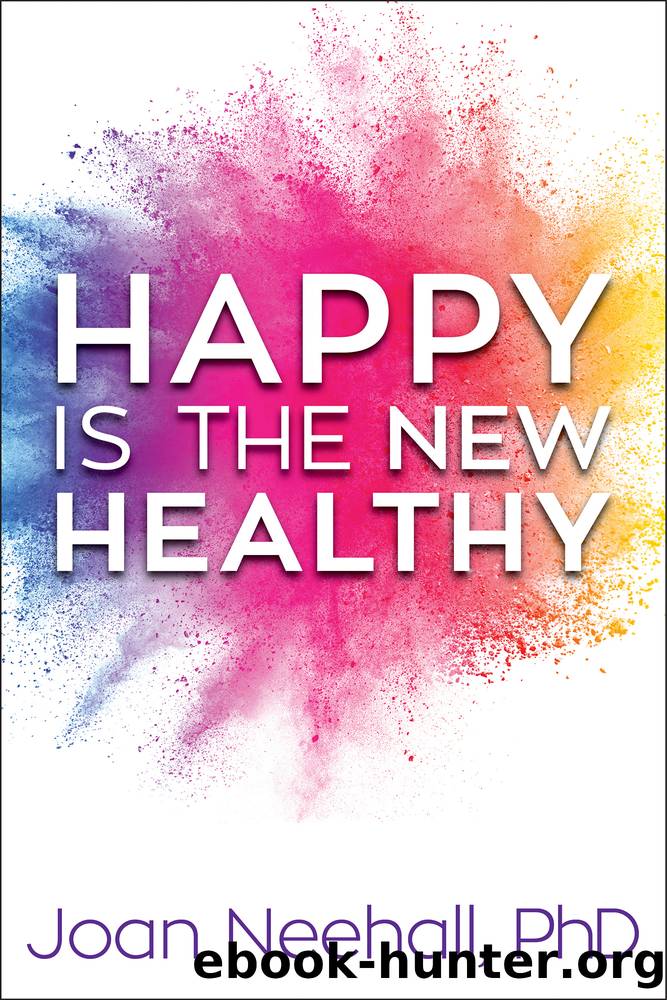Happy Is the New Healthy by Joan Neehall

Author:Joan Neehall
Language: eng
Format: epub
Publisher: Forefront Books
Published: 2021-03-23T00:00:00+00:00
âWhatâs the matter with me?â Marilyn asked me. âWhy canât I be like them?â
When I asked her what she thought would happen if she didnât go on social media for a day, Marilyn was aghast. She looked at me in shock and said, âAre you kidding me? I need to do that. Otherwise, how will I know whatâs going on?â
When I asked her to tell me what social media did for her, she pointed out that it helped her select clothing and accessories to purchase; from the way she presented, it was clear that she believed in buying the best designer label shoes, apparel, or handbags she could afford. She said she learned through social media how to look good. âGoodâ in this context, of course, meant measuring up to whomever she saw on postsâactors, models, famous musicians, or other figures in popular culture.
âWhat does that really do for you?â I pressed.
âWell, it gives me a benchmark,â she said. âIt tells me how I should live.â
âDoes it make you happy?â
âNo,â she said. âBut thatâs not the point. Iâm not happy, but I donât think itâs because of social media. Itâs just because Iâm not as good as those people.â
Marilyn had worked assiduously at learning to be happy, but she hadnât felt happy for years. This was a result of her not believing that she measured up to other people. During childhood, she compared herself to others and found that there was always someone who was better than she was scholastically, physically, or in terms of popularity.
âWhat about relationships?â I asked.
âWell,â she said, âthatâs another problem. Itâs hard.â
Marilyn had had several relationships that didnât work for her. She felt that the men sheâd dated objectified her. They didnât see her for who she really was but rather for the way that she presented, which sheâd learned from social media.
Through therapy, Marilyn eventually got to the point where she could give herself permission to remove herself from social media. At first she disengaged only for a day or so; then she tried four days to check how she felt. After that, she was regularly disengaging for two weeks at a time.
Marilyn eventually found that without social media, her life satisfaction increased. Initially, she felt scared that she would miss out on important details because sheâd grown so used to routinely checking in. Disengaging was a long process for her, and it didnât happen automatically. Automaticity doesnât occur with such a compulsion. But it was important for her to learn to check in with herself rather than to check herself against others. Marilyn took thirty days away from social media to break the habit. She replaced it with savoring her coffee in the morning and being mindful. âIâm creating the gospel according to me,â she said playfully.
Itâs not only about the various sites and applications people use to compare themselves against others but also about when and where they use their devices to do so.
I recently had a patient who was severely obese, as were his wife and two daughters.
Download
This site does not store any files on its server. We only index and link to content provided by other sites. Please contact the content providers to delete copyright contents if any and email us, we'll remove relevant links or contents immediately.
Four Thousand Weeks by Oliver Burkeman(1840)
What Happened to You? by Oprah Winfrey(1764)
Karma by Sadhguru(1604)
This Changes Everything by Unknown(1500)
You Are a Badass: How to Stop Doubting Your Greatness and Start Living an Awesome Life by Jen Sincero(1173)
Don't Sweat the Small Stuff...and It's All Small Stuff by Richard Carlson(1115)
Infinite Circle by Bernie Glassman(1046)
How to Do the Work by Dr. Nicole LePera(1004)
Let's Talk About Hard Things by Anna Sale(986)
Declutter Your Mind: A step by step guide to learn to control your thoughts, stop worrying, relieve anxiety and eliminate panic attacks and negative thinking by Mia Chandler(961)
Who Moved My Cheese? by Spencer Johnson(948)
The 4-Hour Workweek by Timothy Ferris(946)
Real Strength: Build Your Resilience and Bounce Back From Anything by Psychologies Magazine(935)
The Path of Greatness--The Game of Life and How to Play It and Other Essential Works by Florence Scovel Shinn(915)
Breakup Bootcamp by Amy Chan(892)
Be Your Best Self by Mike Bayer(885)
Curative Magic by Rachel Patterson(875)
The Book of Hope by Jane Goodall(867)
Advice for Working Moms (HBR Working Parents Series) by unknow(861)
